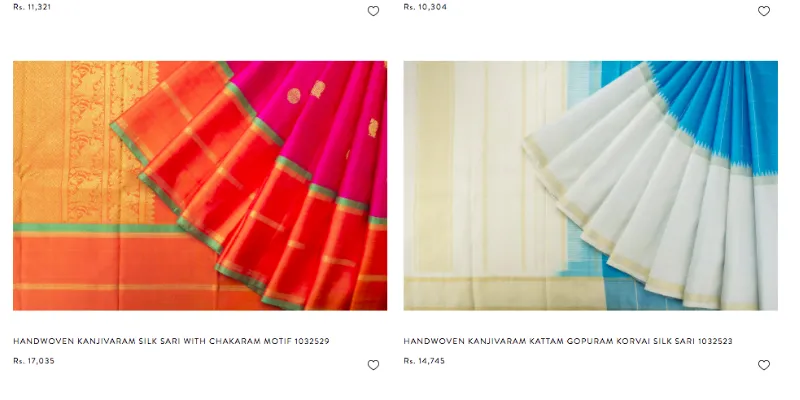She’s creating the ‘Versace’ of handloom sarees, and empowering rural artisans too
With Parisera, an online luxury marketplace for hand-woven saris, Vinutha Subramanian aims to revive antique textiles and crafts on the verge of extinction.
Vinutha Subramanian’s longest running love affair began decades ago when she was a young girl. She would dart out of her room to catch the Bengali weaver in their living room as he unravelled his huge potli of the choicest of weaves from his land. Even though her mum was purchasing, Vinutha would be the one tracing the threads intricately ensconced in the colourful fabrics to form mesmerising patterns.
She carried this adulation with her over the years. And when she learnt that the weavers that formed part of her fondest childhood memories were struggling to keep their craft alive, she decided to set up Parisera, an online luxury marketplace that houses the hand-woven saris of over 10,000 rural artisans.

In love with handloom
A chartered accountant by profession, the first 12 years of Vinutha’s career were spent in financial planning, strategy consulting and SAP. In fact, she had formed and was heading the SAP practice of a large audit firm, when the idea for Parisera struck.
“My bond with the hand-woven fabric goes back to my childhood. I was brought up amid handlooms shopping at exhibitions and cooperative stores,” she tells us.
It is only fitting, then, that she grew up to be a serious handloom influencer. As she became more deeply involved with this grand old Indian craft, she learnt that the Indian handloom industry needed a push and sensed an opportunity.
“Parisera was my way to do our bit; that bolstered my plunge. And as the old saying goes, entrepreneurship is living a few years of your life like most people won’t so that you can spend the rest of your life like most people can’t,” she says.
Parisera, meaning “environment” in Sanskrit, was launched as an online retail store for luxury hand-woven saris.
“Parisera. For designers, we are a marketplace. But more importantly, we work directly with weavers and artisans all over India, give them design elements and get them to weave.
“We mostly work with third-generation weavers and have even employed weavers who had given up weaving and brought them back in the fold. Parisera has sold enough saris of theirs; many of them now exclusively sell on Parisera,” Vinutha says.
Founded in 2014, the e-commerce startup now stocks handloom sarees, stoles, odhnis, and jewellery. Typically, there’s only one piece per design, because it is hand-crafted.
How Parisera works
Vinutha buys from the artisans, marks up and sells them to her end consumers. “Typically 60-70 percent of my top line is theirs. We thus provide income to more than 10,000 weavers,” she reveals.
Vinutha says Parisera has changed the lives of lesser-known artisans. “Recently, we did a batik series where all the saris were sold out from our site in 12 hours. The artisan’s excitement was something else,” she says.
Parisera’s ultimate aim is to position hand-crafted saris as globally desirable apparel, and the startup wishes to heavily target international Indian audiences.
“We are looking at building a ‘Chanel’ or ‘Armani’ of saris. Currently, 50 percent of our business comes from the NRI market, predominantly US, UK, MEA and SEA,” she reveals.
Parisera has around 8,000 visitors every day - which is a scale they have managed to clock mainly through digital marketing.
“Content is a critical piece for organic growth. We have a very strong digital team who run amazing digital campaigns. Nearly 70 percent of our customers are return customers!” she says - adding, however, that word of mouth has had an equally important part to play in their success story.
Reviving crafts and textiles
Global in their ambitions, they are still frugal in their approach. A lot of ingenious hacks have helped them grow 75 percent year on year, and subsequently, clock a small profit this year.

“We have a production house with a photography studio. We use a folding and presentation model - unique to Parisera - that depicts each sari the way it would look draped. Thus, we save on the model and makeup cost. We also decided to go with an in-house developed e-commerce platform rather than a readymade product,” Vinutha says.
“Our back-end application of e-commerce is integrated to analytics solution to continuously track performance, customer behaviour and preferences and profiling. Through all this, we can proudly claim to be one of the few profitable e-commerce companies,” she says.
Parisera's 40-strong team is based in Chennai, and they have been bootstrapping so far.
“We intend to wait another year before we look for outside investors, to scale into the retail space, exhibitions and building our own label. Our idea is to revive certain crafts, which are on the verge of extinction, as well as antique textiles. Going forward, in 2019-2010, we’re looking at opening retail stores in India and overseas, besides participating in exhibitions, pop-up stores and trunk shows,” she reveals.
Vinutha claims that “we don’t have any competition”. “Most of the e-commerce portals in this space start off as handloom and succumb to the pressure of investors and growth, and dilute their core concept branching out into other things. But we have stuck to the hand-crafted sari idea and intend to take this to the next level,” she ends.







